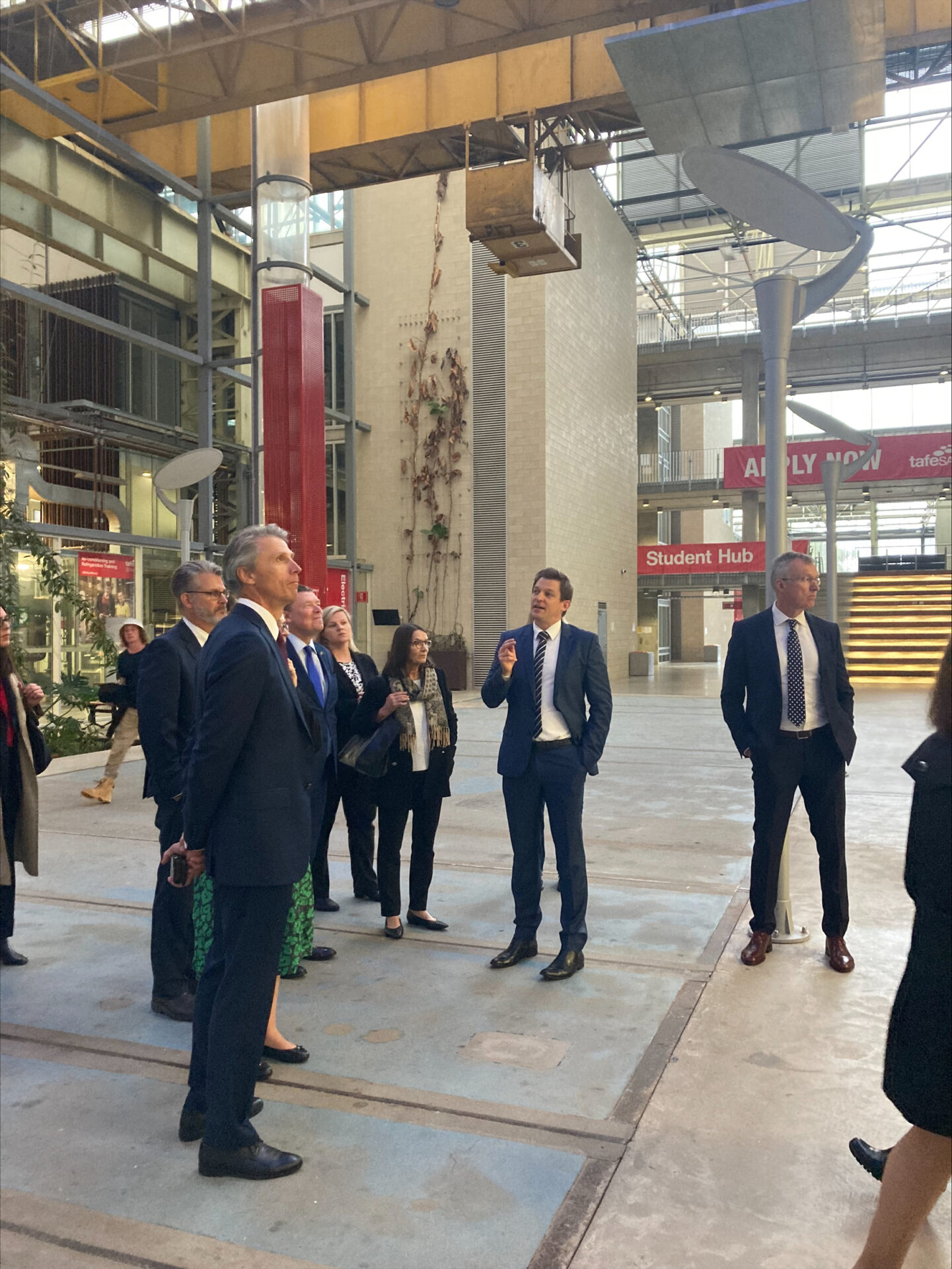NATO Looks to Tonsley Innovation District for Best Practice Learnings

NATO has turned to Tonsley Innovation District in search of leading innovation and best practice initiatives in the defence, energy and climate security sectors.
Ambassadors, High Commissioners, Deputy Heads of Mission and Chargé d’Affaires from 21 NATO-member countries toured Tonsley on 5 May 2023 to glean knowledge about these key focus areas, in which Tonsley has a demonstrated expertise.
Renewal SA Tonsley Precinct Director Phillip Dautel said having the highest level of representation from Australia’s democratic allies wanting to lean on Tonsley for its learnings and experiences was a clear recognition of the District’s capabilities and its global reputation.
“Hosting an international delegation such as this, is something of a peak moment for us,” Mr Dautel said. “The aspiration for Tonsley was to evolve into a place of global relevance with global connections. Last year, Tonsley was inducted into the Global Network of Innovation Districts for its exemplar innovation, collaboration and R&D over the last decade.
“This visit further demonstrates our standing in the international community and supports our capacity to foster international connections with some of the world’s most advanced democratic countries.”
NATO, or the North Atlantic Treaty Organization, is an alliance of countries from Europe and North America whose purpose is to guarantee the freedom and security of its members through political and military means, including the promotion of democratic values, peacekeeping and military intervention when diplomatic efforts fail.
As part of the visit, facilitated by the Department of Premier and Cabinet’s Diplomatic Relations team, diplomats were given a demonstration of cutting-edge exoskeleton technology and its potential application in the defence and energy sectors at Flinders University’s Medical Device Research Institute.
They also toured Tonsley’s centrepiece Main Assembly Building (MAB), where the group was able to see how integrated all the different elements of the District are, as well as how companies such as Zeiss, Tesla, SAGE, Micro X and BAE Systems, are developing world-class products and solutions across Tonsley’s four key sectors: health, medical devices, and assistive technologies; cleantech and renewable energy; automation software and simulation; and mining and energy services.
“Seeing the daily mechanics of an innovation district up close, gave the delegates tangible insights into the innovation coming out of Tonsley and the future outlook,” Mr Dautel said.
“Given the global problem of abandoned manufacturing assets, it was of real interest for the delegation, to learn more from our experiences and our approach in transforming a traditional manufacturing site into opportunities for innovation and sustainable job creation.
“There aren’t many places where industry, academia, vocational training – as well the neighbouring community – share the same space. It is that co-existence, and co-habitation, that sets us apart from the traditional model of industrial parks, office hubs, science parks and university campuses – that tends to operate in isolation and where everyone stays in their silos.”

The delegation rounded out its tour with a presentation from the Department of Energy and Mining on SA’s renewable energy transition and hydrogen aspirations at the Drill Core Reference Library.
“The future of manufacturing, health and ageing, mobility and transport, digitisation and automation and the future of energy such as the emerging hydrogen economy was a significant interest to the international delegates,” Mr Dautel said.
“Tonsley is recognised as an exemplar for a low-carbon commercial District. At a time when the world urgently needs to establish sustainable principles to address climate change, so much can be learned from a site that has already delivered a leading example of adaptive reuse; established an energy scheme in the form of a microgrid and solar production and encouraged alternative means of shared transport.”
As a result of the tour, several key introductions have been made between businesses from the NATO states and Renewal SA, seeking to make connections at Tonsley; highlighting the importance of these types of visits in sparking conversations and identifying areas of common ground for potential new partnerships and collaborations.
“I hope what the delegation took home with them is the understanding that an innovation district like Tonsley is not just about the buildings, or drones and robots – although those things do matter – it is about people. The question that had the most resonance with the group was “Why did people come back after COVID-19?”. The answer is that they came back because human beings need a sense of belonging and community and from that perspective, Tonsley delivers this. They understood that ultimately, Tonsley is an urban renewal project delivering economic development with a community development focus,” Mr Dautel said.
Stay up to date with the latest news, developments events and activities at Tonsley Innovation District